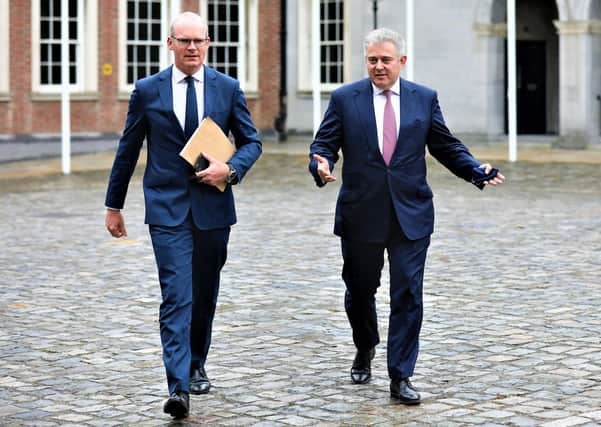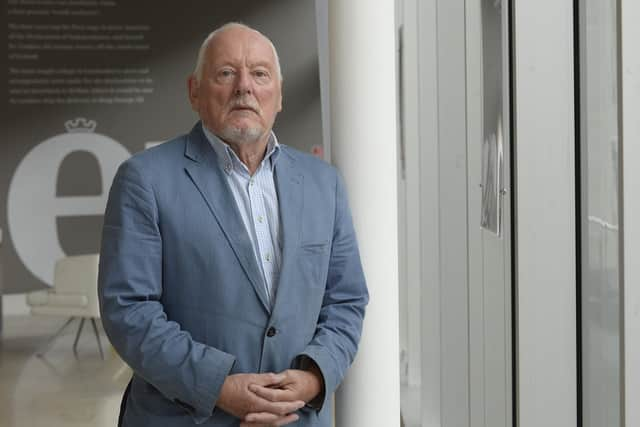Jeff Dudgeon: Brandon Lewis is right to limit scope of legacy investigations


Brandon Lewis the secretary of state for Northern Ireland, in the briefest of Commons statements this month, announced a “statute of limitations, to apply equally to all Troubles-related incidents”.
To understand how radical this move was, you need only look at his predecessor’s 2014 Stormont House Agreement — and the misguided reaction to the latest announcement of the Irish foreign minister, Simon Coveney, who wrongly claimed that it was a breach of the UK’s international obligations.
Advertisement
Hide AdAdvertisement
Hide AdIn reality, the consensus around the Stormont House Agreement was vastly overstated – and the investigations lopsided in a way that undermined it from the start.


Victims’ groups were by no means united in support for it, as anyone who went out and spoke to them can attest.
It is far from clear, anyhow, quite what role Coveney thinks he has here – in instructing another state who they should prosecute, as if the Republic was co-sovereign in Northern Ireland, without any responsibilities whatsoever around criminal justice.
The Stormont Agreement, after talks chaired by the then Northern Ireland Secretary Theresa Villiers, promised “to take forward investigations into outstanding Troubles-related deaths”, adding some repugnant elements, including the introduction of a new offence of historic police misconduct.
Advertisement
Hide AdAdvertisement
Hide AdThe Northern Ireland Office then generated a 124-page Bill in 2018, during the period of Karen Bradley as secretary of state, to implement the panoply of new bodies.
The motor of the bill was continuing criminal investigations by a new Historical Investigations Unit, a parallel police force of the past.
Only the Ulster Unionist Party of the five main local parties opposed this body.
The HIU has now been spectacularly binned, with further Troubles criminal investigations to be statutorily barred, removing the prospect of prosecutions, although no mention was made of stopping ongoing cases.
Advertisement
Hide AdAdvertisement
Hide AdSo we have a non-amnesty amnesty, perhaps the fifth such iteration of the policy since the 1998 Belfast Agreement.
It started with prisoner releases, the disbandment of the Royal Ulster Constabulary, and ended with Tony Blair’s ‘On The Run’ letters of comfort (only for republicans).
This has been the direction of travel since the December 2019 general election result and confirms a welcome move away from the approach long taken by the Northern Ireland Office.
Despite what Stephen Farry MP of the Alliance Party said in the Commons about “the false narrative of vexatious veterans’ prosecutions,” criminal investigations had become entirely lopsided and unfair against the security forces. In any event for all the effort by police and prosecutors, there has only been one conviction in the last six years, and just nine people charged. .
Advertisement
Hide AdAdvertisement
Hide AdIt seems that the view in the Policy Exchange paper Protecting Those Who Serve (June 2019) has come, precisely, to pass. It said, “further investigations and prosecutions were not in the public interest, in view of the unfairness to those who had already been investigated, the limited prospects for conviction, and the resource implications”.
Lord Tebbit, who understands as well as anyone the devastation the Troubles inflicted on so many individuals and families, has publicly agreed with this view and supports Brandon Lewis’s announcement, albeit with understandable reluctance.
It is indeed the unfairness of prosecution policy that both brought the military veterans into the debate and through the novel power of social media into the constituencies of Great Britain.
The no-politics policy of the British Legion was thus circumvented, creating something like a US-style lobby. That is why London has taken back control.
Advertisement
Hide AdAdvertisement
Hide AdThis is justified — after all, why should British veterans be denied a voice? It is estimated that more than 300,000 of them served in Northern Ireland and more than 300 were killed.
The key paragraph in the NIO’s accompanying Command Paper Addressing the Legacy of Northern Ireland’s Past (32 pages) which expanded on the no-investigation policy reads, “We are therefore considering a proposed way forward that would end judicial activity in relation to Troubles-related conduct across the spectrum of criminal cases, and current and future civil cases and inquests.”
This is truly radical and will spark much controversy. However without facing down this element of lawfare, the new policy will have minimal effect on the ground.
Again we seem to be approaching the Policy Exchange view which in 2019 commended “the strong case for the proposal made by the Attorney General for Northern Ireland, John Larkin QC, in 2013, to draw a clear line under the past, bringing to an end all inquests, inquiries, investigations and prosecutions into Troubles-related deaths”.
Advertisement
Hide AdAdvertisement
Hide AdThe courts in Belfast aided by £500 million of legal aid are clogged with legacy and lawfare cases.
There is usefully a reference in the Command Paper to pointless, legally-aided litigation, suggesting certain action in that department is possible although reducing lawyers’ earnings is never easy.
The Malone House Group of lawyers and academics, of which I am convenor, welcomes the government’s direction of travel but there are many concerns about the management, scale and value of the new information retrieval and oral history bodies.
The model of the Police Ombudsman’s Office in Northern Ireland has not worked well and should not lightly be extended to this new context.
Advertisement
Hide AdAdvertisement
Hide AdSlipping into talk of truth recovery is dangerously easy but without being post-modern there is certainly no such thing as one truth.
Information retrieval too has to be time and cost limited or it will grow into something approaching the proposed Stormont House bodies.
They had the local university law departments salivating in terms of employment of graduates and policy influence hopes, not least in the rewriting of history.
Victim-focused justice is unbalanced justice and presents great difficulties where competing European Convention rights are concerned, particularly in relation to the rarely mentioned Articles 6 and 8 which protect reputations, the right to a fair trial and private life.
Advertisement
Hide AdAdvertisement
Hide AdThey do mean that the much vaunted information recovery processes have to prevent protected material being revealed, let alone published.
We are now promised a bill in the autumn which, as Sir Mark Francois MP pointed out in the Commons, would not complete its passage until well into 2022.
It will also be subject to a significant parliamentary battering not unlike the Overseas Operations (Service Personnel and Veterans) Act 2021, which addresses military operations outside the UK.
That act survived the lower house unscathed, but had a rough ride in the Lords.
Advertisement
Hide AdAdvertisement
Hide AdMeanwhile the NIO has strangely allowed Dublin into the legacy process to co-chair a consultation process which could last for months.
Has Simon Coveney been sold a pup or are there contradictory forces at work?
There are two other dangers. Operation Kenova run by a former Chief Constable of Bedfordshire, Jon Boutcher, was brought in to replace the PSNI when courts directed in a small number of legacy cases.
He is subject to limitless praise, not least by the chair of the Northern Ireland Affairs Committee, Simon Hoare, who in a recent university debate said he is “on the cross benches” where Irish unity is concerned. But Brandon Lewis regularly repeats the name, even though his Command Paper notes that after six years and £30 million no Kenova prosecutions have successfully ensued.
Advertisement
Hide AdAdvertisement
Hide AdKenova takes the dogmatic requirement for ‘Article 2 compliance’ to the Saville Inquiry level. Boutcher’s efforts are heavily directed to assisting the victims’ families but his families are a small and peculiar subset, being mostly related to informants and agents.
It is never easy or even wise to detail the nature of such people’s lives to others. That is why The National Archives at Kew, even after a century, withholds the names of informants and agents.
In relation to Strasbourg, the time has come for a vigorous and robust operation at the Committee of Ministers in the Council of Europe to call the Article 2 compliance dogma into question and to ask if the European Court of Human Rights is getting it wrong on its prolonged Northern Ireland legacy cases.
• Jeff Dudgeon, a former Ulster Unionist Party councillor, is a Visiting Fellow at the think tank Policy Exchange, where this essay first appeared, and a convenor of the Malone House Group, a platform of academics and lawyers in Belfast
——— ———
A message from the Editor:
Advertisement
Hide AdAdvertisement
Hide AdThank you for reading this story on our website. While I have your attention, I also have an important request to make of you.
With the coronavirus lockdown having a major impact on many of our advertisers — and consequently the revenue we receive — we are more reliant than ever on you taking out a digital subscription.
Subscribe to newsletter.co.uk and enjoy unlimited access to the best Northern Ireland and UK news and information online and on our app. With a digital subscription, you can read more than 5 articles, see fewer ads, enjoy faster load times, and get access to exclusive newsletters and content. Visit https://www.newsletter.co.uk/subscriptions now to sign up.
Our journalism costs money and we rely on advertising, print and digital revenues to help to support them. By supporting us, we are able to support you in providing trusted, fact-checked content for this website.
Ben Lowry
Acting Editor